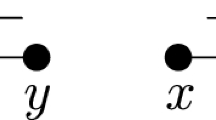Abstract
In this paper we propose a semantics for dyadic deontic logic with an explicit preference ordering between worlds, representing different degrees of ideality. We argue that this ideality ordering can be used in two ways to evaluate formulas, which we call ordering and minimizing. Ordering uses all preference relations between relevant worlds, whereas minimizing uses the most preferred worlds only. We show that ordering corresponds to strengthening of the antecedent, and minimizing to weakening of the consequent. Moreover, we show that in some cases ordering and minimizing have to be combined to obtain certain desirable conclusions, and that this can only be done in a so-called two-phase deontic logic. In the first phase, the preference ordering is constructed, and in the second phase the ordering is used for minimization. If these two phases are not distinguished, then counterintuitive conclusions follow.
This research was partially supported by the Esprit iii Basic Research Project No.6156 Drums II and the Esprit III Basic Research Working Group No.8319 Modelage.
Access this chapter
Tax calculation will be finalised at checkout
Purchases are for personal use only
Preview
Unable to display preview. Download preview PDF.
Similar content being viewed by others
References
N. Rescher. The logic of preference. In Topics in Philosophical Logic. D. Reidel Publishing Company, Dordrecht, Holland, 1967.
B.C. van Fraassen. The logic of conditional obligation. Journal of Philosophical Logic, 1:417–438, 1972.
B.C. van Fraassen. Values and the heart command. Journal of Philosophy, 70:5–19, 1973.
Y. Shoham. Reasoning About Change. MIT Press, 1988.
S. Kraus, D. Lehmann, and M. Magidor. Nonmonotonic reasoning, preferential models and cumulative logics. Artificial Intelligence, 44:167–207, 1990.
D. Makinson. Five faces of minimality. Studia Logica, 52:339–379, 1993.
C. Boutilier. Conditional logics of normality: a modal approach. Artificial Intelligence, 68:87–154, 1994.
B. Hansson. An analysis of some deontic logics. In Deontic Logic: Introduc-tionary and Systematic Readings, pages 121–147. D. Reidel Publishing Company, Dordrecht, Holland, 1971.
J.W. Forrester. Gentle murder, or the adverbial Samaritan. Journal of Philosophy, 81:193–197, 1984.
C. E. Alchourrón. Philosophical foundations of deontic logic and the logic of defeasible conditionals. In Deontic Logic in Computer Science: Normative System Specification, pages 43–84. John Wiley & Sons, 1994.
D. Ross. The Right and the Good. Oxford University Press, 1930.
S.O. Hansson. Preference-based deontic logic (PDL). Journal of Philosophical Logic, 19:75–93, 1990.
B.F. Chellas. Modal Logic: An Introduction. Cambridge University Press, 1980.
H. Prakken and M.J. Sergot. Contrary-to-duty imperatives, defeasibility and violability. In Proceedings of the Second Workshop on Deontic Logic in Computer Science (Deon’94), Oslo, 1994. To appear in: Studia Logica.
L.W.N. van der Torre and Y.H. Tan. Cancelling and overshadowing: two types of defeasibility in defeasible deontic logic. In Proceedings of the Fourteenth International Joint Conference on Artificial Intelligence (IJCAI’95). Morgan Kaufman, 1995.
J.F. Horty. Deontic logic as founded in nonmonotonic logic. Annals of Mathematics and Artificial Intelligence, 9:69–91, 1993.
A.L. Brown and S. Mantha. Preferences as normative knowledge: Towards declarative obligations. In Proceedings of the First Workshop on Deontic Logic in Computer Science (Deon’91), pages 142–163, Amsterdam, 1991.
C. Boutilier. Toward a logic for qualitative decision theory. In Proceedings of the Fourth International Conference on Principles of Knowledge Representation and Reasoning (KR’94), pages 75–86, 1994.
A. Ross. Imperatives and logic. Theoria, 7:53–71, 1941.
D. Lewis. Semantic analysis for dyadic deontic logic. In Logical Theory and Semantical Analysis, pages 1–14. D. Reidel Publishing Company, Dordrecht, Holland, 1974.
H. Levesque. All I know: a study in autoepistemic logic. Artificial Intelligence, 42:263–309, 1990.
M. Beizer. A logic of deliberation. In Proceedings of the Fifth National Conference on Artificial Intelligence, pages 38–43, 1986.
L.W.N. van der Torre. Violated obligations in a defeasible deontic logic. In Proceedings of the Eleventh European Conference on Artificial intelligence (ECAI’94), pages 371–375. John Wiley & Sons, 1994.
R. Reiter. A theory of diagnosis from first principles. Artificial Intelligence, 32:57–95, 1987.
Y.-H. Tan and L.W.N. van der Torre. Representing deontic reasoning in a diagnostic framework. In Proceedings of the Workshop on Legal Applications of Logic Programming of the Eleventh International Conference on Logic Programming (ICLP’94), Genoa, Italy, 1994.
Y.-H. Tan and L.W.N. van der Torre. Diode: Deontic logic based on diagnosis from first principles. In Proceedings of the Workshop ‘Artificial normative reasoning’ of the Eleventh European Conference on Artificial Intelligence (ECAI’94), Amsterdam, 1994.
Y.-H. Tan and L.W.N. van der Torre. Why defeasible deontic logic needs a multi preference semantics. In Proceedings of the ECSQARU’95. Lecture Notes in Artificial Intelligence 946. Springer Verlag, 1995.
J. Pearl. A calculus of pragmatic obligation. In Proceedings of the UAI’93, pages 12–20, 1993.
Y.-H. Tan and L.W.N. van der Torre. Multi preference semantics for a defeasible deontic logic. In Proceedings of the JURIX’94, Amsterdam, 1994.
Author information
Authors and Affiliations
Editor information
Editors and Affiliations
Rights and permissions
Copyright information
© 1996 British Computer Society
About this paper
Cite this paper
Tan, YH., van der Torre, L.W.N. (1996). How to Combine Ordering and Minimizing in a Deontic Logic based on Preferences. In: Brown, M.A., Carmo, J. (eds) Deontic Logic, Agency and Normative Systems. Workshops in Computing. Springer, London. https://doi.org/10.1007/978-1-4471-1488-8_12
Download citation
DOI: https://doi.org/10.1007/978-1-4471-1488-8_12
Publisher Name: Springer, London
Print ISBN: 978-3-540-76015-3
Online ISBN: 978-1-4471-1488-8
eBook Packages: Springer Book Archive




